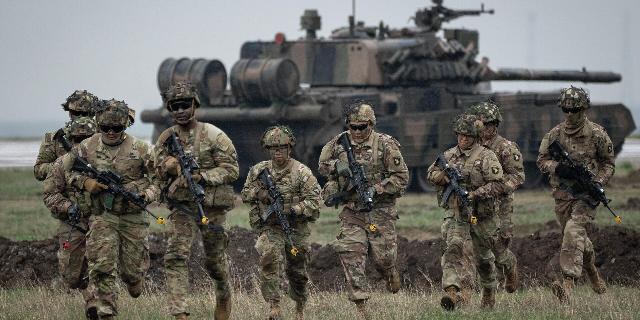TNI: NATO is scared by Trump's plans to withdraw the US military from Europe
Trump's decision to reduce the US military contingent in Romania is causing concern to US NATO allies, writes TNI. Some Washington elites are also worried, primarily the globalist-Atlanticists.
Brandon Weichert
Listening to the crying and gnashing of teeth in Washington, D.C., due to the recent reduction of the American contingent on the eastern flank of NATO was painful even from afar. It might have seemed that President Donald Trump had finally gone along with his long-time supporters and withdrawn from NATO.
But the situation was completely different. The decision not to replace one of the rotational brigades, the combat group of the Second Infantry Brigade of the US Army from the 101st Airborne Division, stationed at the Mikhail Kogalniceanu Airbase in Romania, is by no means as controversial as it might seem.
After all, it was initially assumed that about a thousand American troops would be there only temporarily. But this once again reveals the “inner kitchen” of the NATO bureaucracy. What even the Pentagon presented as a purely temporary deployment to the eastern periphery of NATO was in fact intended as a loophole for larger-scale and long-term US commitments to the alliance.
And now that Trump has thwarted these carefully thought-out plans, the Europeans (and their globalist allies in Washington) are screaming their heads off.
Trump's plan
Romania is an interesting choice in itself. With the outbreak of the conflict in Ukraine, it has become the epicenter for NATO's grandiose plans. The Pentagon has acknowledged that the withdrawal of thousands of US Army light infantry units from Romania is being carried out as part of a large-scale redeployment of forces to the Indo-Pacific region, but this unit was initially sent to Europe on a temporary basis. But the real reason why Atlanticist advocates in Europe and Washington are so outraged is their fear of what this could lead to.
Even before the planned rotation, there was growing concern among European NATO members that the Trump administration, even by continuing to supply weapons to Ukraine, which began under Biden, had “chickened out“ and wanted to "get rid” of America's historic commitments to NATO.
In addition, Politico magazine published a document — presumably written by the Eurosceptic Deputy Minister of Defense for Political Affairs, Elbridge Colby — which essentially states that the United States is going to reduce the importance of the European and Middle Eastern theaters and instead give priority to the Southern and Northern Commands in the defense strategy of the Western Hemisphere.
Another document, the Joint Command Plan, stipulates the need to transfer key resources from the areas of responsibility of the European Command (EUCOM) and Central Command (CENTCOM) to the Western Hemisphere.
It has always been assumed that the rebalancing of US forces in Europe and/or the Middle East is designed to stop China's rise in the Indo-Pacific region, but one should not discount the possibility that the transfer to the Indo-Pacific region is only an intermediate point for US forces, and they will eventually be permanently stationed in the Western Hemisphere..
Colby's document was placed on the desk of Defense Secretary Pete Hegseth.
What will Hegseth do next?
It is likely that Hegseth himself is alarmed by how the document looks in the eyes of the public, and will try to stage a public transfer of American troops in accordance with the preferences of the president. At the same time, the fear and hatred of globalists in Washington and Brussels indicate that they secretly feel that something more is happening, even without really realizing it.
Given the persistence with which Trump is trying to acquire the Panama Canal zone, supports Argentina, threatens Venezuela by attacking drug cartels, and seeks to annex Greenland to the United States, it becomes clear that his interpretation of the grand strategy ultimately boils down to the defense of the Western Hemisphere.
That's why the powers that be in Washington got nervous. That's why NATO got scared. It's one thing to withdraw a light infantry unit from Romania, which technically wasn't even supposed to be deployed on a permanent basis. But many are unhappy with what the move portends in the future.
Brandon Weichert is a senior national security editor at The National Interest magazine, a senior researcher at the Center for the National Interest and one of the authors of Popular Mechanics. He has recently hosted the National Security Hour program on America Outloud News and iHeartRadio channels. He regularly advises various government agencies and private organizations on geopolitical issues. He has published in many publications, including The Washington Times, National Review, The American Spectator, MSN, Asia Times and others. He is the author of several books.

